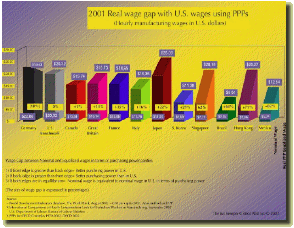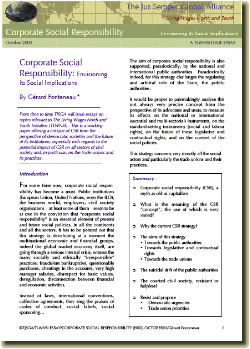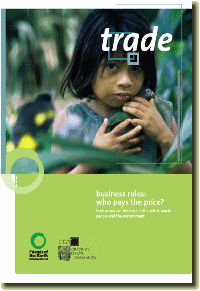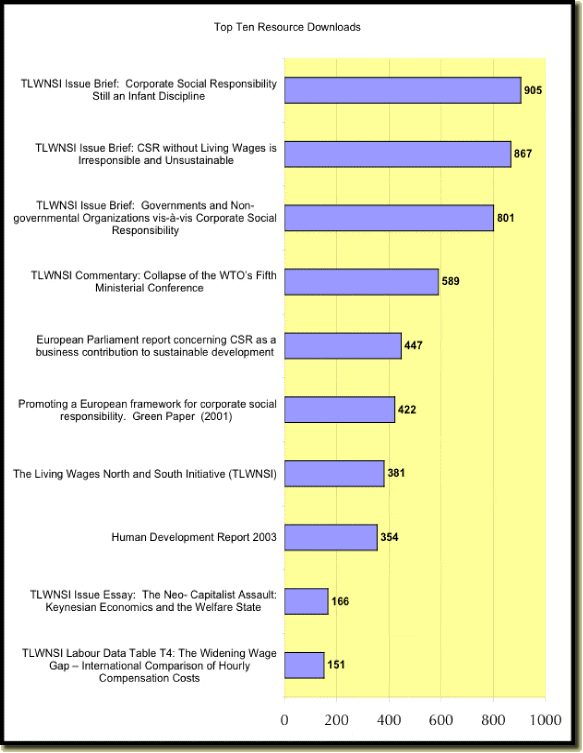In this issue:
WAGE GAPS BETWEEN G7 AND EMERGING MARKETS (1975-2001) ILLUSTRATE A KEY TRAIT OF DARWINIAN CAPITALISM
These wage gap charts express the difference between hourly manufacturing real purchasing power parity (PPP) wages in the U.S. and all other economies. Living wages are calculated by applying the PPPs reported for each country by the World Bank and the OECD to their hourly nominal manufacturing wages. PPPs reflect the currency units required in a given currency to buy the same goods and services that can be purchased in the base country with one currency unit. The PPPs are, in effect, an estimate of the cost of living in each economy. manufacturing wages. PPPs reflect the currency units required in a given currency to buy the same goods and services that can be purchased in the base country with one currency unit. The PPPs are, in effect, an estimate of the cost of living in each economy.
In this way, equal PPP compensation expresses the hourly U.S. dollar nominal rate required in a given country, in terms of purchasing power, in order to equally compensate local workers as equivalent U.S. workers are compensated for equal work rendered. This is how we believe a living wage should be defined; thus, these living wages constitute our definition of fair compensation.
An Extremely Unfair System Given the fact that the purchasing power of equivalent manufacturing workers in most emerging economies is dramatically lower than that of their counterparts in the U.S., the resulting wage gaps are important evidence illustrating the huge disparity and unfairness of the global market system. Both domestic governments in the South and their partners in the North enforce an extremely cheap labour system. Indeed, the first reason why global corporations set-up manufacturing operations in the South, is because they are able to exploit workers by paying hunger wages vis-à-vis what they pay in the North for equivalent work, which in both cases is utilized to produce products and services that are marketed in global markets at global prices. The exploitation of enforced cheap labour costs, to be sure, is the major contributor to the increase of productivity and shareholder value among multinational corporations. Thus, these wage gaps expose a system of conscious and strategic exploitation of workers in the South. In this way, we contend that there is no other reason for materially compensating southern workers, for equal work rendered, at a dramatically lower standard of living than their northern counterparts, but for the pursuit of increased shareholder value in the North's global corporations and the monetary benefit of the South's domestic oligarchies. Although PPPs are only a cost of living assessment and not an exact measure, they eliminate the argument of lower costs of living for the enormous differences in wages.
Some of the highlights in these charts are:
- Among the G7 and some of the so-called "emerging" markets, Mexico has the lowest nominal wa as well as the worst real purchasing power parities (PPPs) wage in 2001, for it has the greatest equalized wage gap with the U.S. (82%) -a Mexican worker earns only 18% of the purchasing power (material quality of life) enjoyed by the equivalent U.S. counterpart;
- Even in Brazil's case -the most similar economy with available data- the nominal wage and the wage gap are clearly less poor than in the Mexican case;
- Among Asian economies, all show higher nominal wages and smaller wage gaps than Mexico. South Korea, in particular, which has opened its economy in a strategically selective manner, is practically at the same wage level as that of the G7 with a gap of only 29% in 2001.
Download the full catalogue of fourteen charts in a pdf file. Download the file here.
For the wage gap page with additional information and detailed sources click here.
TOP
CORPORATE SOCIAL RESPONSIBILITY: ENVISIONING ITS SOCIAL IMPLICATIONS
Gérard Fonteneau, advisor of the European Trade Union Confederation, offers a critical perspective on the development of corporate social responsibility, which is in full empathy with some of the main concerns that The Jus Semper Global Alliance has relative to the main path that CSR development has taken. Some of these concerns are: - Why are corporations and, paradoxically, national and international public authorities as well as many civil organizations supporting a CSR which soothes the needs of corporations without equally addressing the needs of society ?
- Why does the individual's social behaviour have to abide by national and international laws, whereas corporations are praised for developing their own social standards and for observing them on a voluntary basis with no legal bindings whatsoever?
- Are corporate citizens in supposedly democratic societies -where the governments' main responsibility is to procure the welfare of all ranks of society- to have special privileges above democracy and above the rule of law since there appears to
 be little intention to legislate corporate behaviour? be little intention to legislate corporate behaviour?
The author 's working paper constitutes a sound critique of CSR from the perspective of democratic societies and the future of its institutions, especially with regards to the potential impact of CSR on all sectors of civil society and, in particular, on the trade unions and their practices.
Summary of contents: - Corporate social responsibility (CSR), a myth as old as capitalism
- What is the meaning of the CSR "concept", the use of which is very varied?
- Why the current CSR strategy?
- The aims of these strategies
- Towards the public authorities
- Towards legislative and contractual rights
- Towards the trade unions
- The suicidal drift of the public authorities
- The courted civil society, resistant or helpless?
- Resist and propose
- Democratic urgencies
- Trade union priorities
Download The Jus Semper Global Alliance's new TLWNSI Essay on CSR and democracy here.
TOP
THE UN SUB-COMMISSION ON THE PROMOTION AND PROTECTION OF HUMAN RIGHTS HAS DRAFTED NORMS THAT SIGNAL A POSSIBLE ADVENT OF COMPULSORY CSR, BUT CONTINUES TO LEGITIMIZE A STRUCTURE THAT GENERATES SHEER INEQUALITY BETWEEN NORTH AND SOUTH
The Sub-Commission on the Promotion and Protection of Human Rights, under the UN Economic and Social Council (ECOSOC), approved, in its fifty-fifth session last August, the Norms on the responsibilities of transnational corporations and other business enterprises with regard to human rights. The Sub-Commission in a resolution unanimously approved the Norms submitted by the Working Group on that topic and decided to transmit those Norms to the Commission on Human Rights for consideration and adoption by the Commission in March 2004.
The Norms are based on the principle that albeit States have the primary responsibility on the protection of human rights, multinational corporations and other business enterprises, as organs of society, -including officers and persons working for them- are also responsible for promoting and securing human rights as set forth in the Universal Declaration of Human Rights. The Norms acknowledge various multilateral sets of principles, guidelines, standards and recommendations, such as the UN Global Compact, the OECD Guidelines for MNCs, the ILO Tripartite Declaration of Principles Concerning MNCs as wells as the ILO Labour Conventions and Recommendations. The UN proclaims these new Norms and urges the world community to make every effort to disseminate them and respect them. Although the Norms are a far stronger vehicle for achieving minimally acceptable standards of CSR -and some would argue that they are a step in the direction of compulsory business practices- than the mere set of principles of the global compact, it is up to States to enforce them. Furthermore, even if they are all made legally binding, there remains the same degree of ambiguity that is prevalent in key areas of social responsibility. In the area of greatest concern for TLWNSI, the right to a living wage, which is critical for good corporate citizenship and sustainability despite its gross oblivion by most stakeholders, the Norms maintain the same criterion currently used by the ILO and other frameworks. This makes the concept of fair compensation clearly ambiguous. The greatest hurdle, for the incorporation of the concept of living wages into a legal framework, is that these Norms continue to base their wage criteria on the notion of national conditions. In our opinion, what these Norms must address is the dramatic exploitation of Southern workers that multinationals practice on a daily basis as endorsed in the criteria of prevailing national conditions, for the wages that they pay are dramatically lower than the local cost of living and, thus, workers live in complete misery by either a local or northern standard. The question that must be addressed and resolved in favour of true social justice and human rights observance is why most stakeholders continue to use a criterion legitimizing the use of norms (in purchasing power parities/cost of living terms) where workers in the South receive a far lower standard than their counterparts in the North? That is, why are workers in the South not entitled to the principle of equal remuneration for equal work (in PPP terms)? If southern workers continue to endure a system where they are denied a dignified life and the Human Rights framework ignores the problem, then what is the point of these Norms? The Norms are an expression of growing concern for an ethos that is, above all, a generator of the greatest inequality and misery that North and South have endured in contemporary times. Nonetheless, they fail to tackle, once again, the key element generating such inequality: the globalization of markets, prices and consumers but not of labour endowments. Download the full TLWNSI commentary on pdf Download the full Norms draft commentary with UN Commentary on the Norms on pdf TOP
CANCUN TRADE SUMMIT. EXCEPT FOR NEWFOUND UNITY AMONG THIRD WORLD NATIONS THERE WERE NO SURPRISES: THE WTO'S FIFTH MINISTERIAL CONFERENCE COLLAPSED OVER THE NORTH'S AGRICULTURAL PROTECTIONISM
The summit collapsed when the EU, the US and Japan attempted to impose an agenda that focused on new investment rules. But, in a so-called free market ethos, the North's refusal to liberalise its agricultural sector, since the beginning of the post-war era, has been the deepest thorn in the construction of a level-playing field trade system. Currently, the North spends over $300 billion dollars annually in subsidies to its farmers, to protect them from the South's agricultural exports and in many instances to destroy the livelihoods of millions of farmers in the South who cannot even compete in their own domestic markets with the exports of the North's farmers and agri-businesses mega-corporations of the likes of Cargill. The U.S. has a $150 billion dollars annual farm bill to protect this sector, which is far more than the GNI of many poor nations. The EU provides, among others, $2 dollars a day to each of its cows, which is twice as much amount that over 1.2 billion people (the poorest one-fifth of the world's population) have to survive each day. Japan has agricultural import tariffs as high as 1000%, such as in the case of rice. Yet, the North continues with its old abusive ways.
Read the full TLWNSI commentary here. TOP
RESOURCE CENTRE This issue features the following resources:
BUSINESS RULES: WHO PAYS THE PRICE? How corporate influence in the World Trade Organization (WTO) impacts people and the environment
This report, from Friends of the Earth International, exposes the power of MNCs on the rules of World Trade. The report is a preamble of the strategy that corporate lobbyists followed during the WTO Ministerial in Cancun, Mexico last September.
While this report reveals only the tip of the iceberg, it leaves no doubt about the moral bankruptcy of the WTO system. Behind the rhetoric about 'rules based trade', 'liberalization' and the 'Doha Development Round', the reality is that the WTO's trade and investment rules are consistently being shaped around the interests of transnational corporations, consolidating their global expansion and removing any remaining obstacles. the rhetoric about 'rules based trade', 'liberalization' and the 'Doha Development Round', the reality is that the WTO's trade and investment rules are consistently being shaped around the interests of transnational corporations, consolidating their global expansion and removing any remaining obstacles. Through a series of case studies, this publication highlights the powerful influence of corporations on the World Trade Organization (WTO) process. Big business has unparalleled access to trade negotiators, and this has resulted in a set of trade rules and agreements that directly benefit transnational commercial enterprises - often at the expense of local communities and small businesses, as well as future generations and the environment. The transnationals featured in this publication include Pfizer, Suez, Halliburton, Monsanto and Exxon Mobil. The corporate lobby groups include the International Chamber of Commerce (ICC), Pharmaceutical Research and Manufacturers of America (PhRMA), the Biotechnology Industry Organization (BIO), the European Services Forum (ESF), the US Coalition of Service Industries (USCSI), the National Foreign Trade Council (NFTC) and the American Farm Bureau Federation (AFBF).
For a detailed review of the report, download the pdf file here. TOP
TOP RESOURCE DOWNLOADS
Following are the top ten internal and external information resources downloaded from our website in the previous quarter. Below the chart are the links for each resource if you want to download them:

To download click below:
1.TLWNSI Issue Brief: CSR Still an Infant Discipline
2.TLWNSI Issue Brief: CSR Without Living Wages is Irresponsable and Unsustainable
3.TLWNSI Issue Brief: Governments and Non-governmental Organizations vis-à-vis Corporate Social Responsibility
4.TLWNSI Commentary: Collapse of the WTO's Fifth Ministerial Conference
5.European Parliament report concerning CSR as a business contribution to sustainable development
6.Promoting a European framework for corporate social responsibility. Green Paper (2001)
7.The Living Wages North and South Initiative (TLWNSI)
8.Human Development report 2003
9.TLWNSI Issue Essay: The Neo- Capitalist Assault: Keynesian Economics and the Welfare State
10. TLWNSI Labour Data Table T4: The Widening Wage Gap - International Comparison of Hourly Compensation Costs TOP
CSR TOOL: GRI 2002 GUIDELINES. A COMMON FRAMEWORK FOR SUSTAINABILITY IN REPORTING
The Global Reporting Initiative (GRI), based in Amsterdam, is a multi-stakeholder process and independent institution whose mission is to develop and disseminate globally applicable Sustainability Reporting Guidelines. These Guidelines are for voluntary use by organisations for reporting on the economic, environmental, and social dimensions of their activities, products, and services:
Download the 2002 guidelines
Thank you so much for your support. If you have any questions or comments, Please e-mail us: gsc@jussemper.org
If you are not a member of our eCommunity yet, please click here to sign up for TJSGA's eCommunity to receive our quarterly newsletter. If you do not wish to continue receiving our quarterly newsletter, just e-mail us writing in the subject "unsubscribe" nosuscrip@jussemper.org. TOP | 




 manufacturing wages. PPPs reflect the currency units required in a given currency to buy the same goods and services that can be purchased in the base country with one currency unit. The PPPs are, in effect, an estimate of the cost of living in each economy.
manufacturing wages. PPPs reflect the currency units required in a given currency to buy the same goods and services that can be purchased in the base country with one currency unit. The PPPs are, in effect, an estimate of the cost of living in each economy. be little intention to legislate corporate behaviour?
be little intention to legislate corporate behaviour? the rhetoric about 'rules based trade', 'liberalization' and the 'Doha Development Round', the reality is that the WTO's trade and investment rules are consistently being shaped around the interests of transnational corporations, consolidating their global expansion and removing any remaining obstacles.
the rhetoric about 'rules based trade', 'liberalization' and the 'Doha Development Round', the reality is that the WTO's trade and investment rules are consistently being shaped around the interests of transnational corporations, consolidating their global expansion and removing any remaining obstacles.


